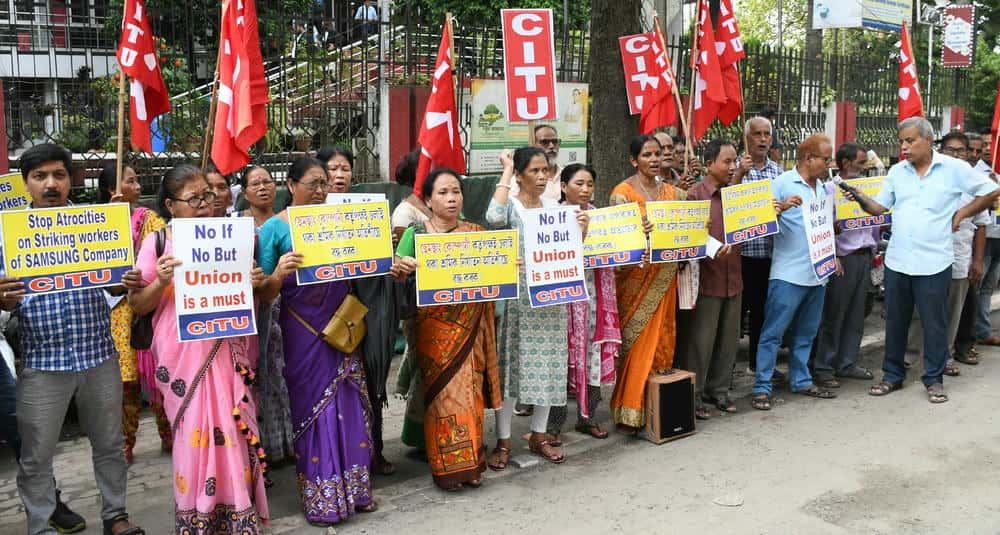Not workers, but crony capitalism scares investors: Trade union leader slams Centre ahead of July 9 strike

Veteran trade union leader Ranjan Chowdhury has hit out at the Modi government, blaming its pro-corporate policies—not India’s workers—for the sharp decline in foreign investment. In a press statement issued on Monday, Chowdhury said the central government’s favouritism towards two business conglomerates is undermining both employment and investor confidence.
The remarks come ahead of a nationwide strike on July 9 called by 10 Central Trade Unions, based on a 17-point charter of demands. Chowdhury described the strike as a critical turning point in the fight against anti-labour policies, asserting it would mark the beginning of a larger, long-term movement involving workers, farmers, and agricultural labourers.
Chowdhury argued that the Centre’s efforts to weaken trade unions and privatise public sector units are deterring investment far more than any resistance from the workforce. “Investors aren’t staying away because of labour laws or strikes—they’re staying away because our economy is now skewed in favour of two companies. This crony capitalism is scaring off serious investors,” he said.
He accused the government of freezing recruitment across central ministries and public sector undertakings (PSUs), stating that 15 lakh vacancies remain unfilled. “Instead of hiring fresh talent, they’re bringing back retired employees at lower wages with no social security. This has already happened in the Railways and steel sector,” Chowdhury said.
Criticising the push for the Unified Pension Scheme (UPS), Chowdhury claimed it’s worse than the existing National Pension System (NPS), eliminating any future option for employees to shift back to the old pension scheme. He also took issue with the government’s use of Employees’ Provident Fund Organisation (EPFO) funds to subsidise employers, calling it a betrayal of workers’ rights.
Among the key demands being raised are an increase in MGNREGA workdays, a national minimum wage of Rs 26,000 per month, a PF pension of at least Rs 9,000 per month, and a Rs 6,000 monthly pension for those outside any formal pension scheme.
Chowdhury revealed that despite earlier assurances from Union Labour Minister Mansukh Mandaviya, there has been no meaningful dialogue with trade unions. Instead, the government is pushing forward with four Labour Codes that, according to unions, roll back decades of hard-won labour protections.
While the Centre argues that the new codes are essential for improving the business climate, Chowdhury said they are being forced on states under pressure. “The Prime Minister’s Office is directly advising state governments to align their laws with the Labour Codes, even though most non-BJP states haven’t notified them. This is a double game,” he said.
He warned that Indian democracy is being undermined by the lack of consultation, pointing out that the Indian Labour Conference has not been convened in over a decade. “There is no space for dialogue. Instead, workers are being told to accept policies that benefit only a few at the top,” Chowdhury said.
He dismissed the argument that Labour Codes will attract investment, pointing instead to rising communal violence, poor law and order, and the concentration of national wealth in the hands of two corporates. “Why would global investors enter a market where there’s no fair competition, and the rules are tilted towards Adani and Ambani?” he asked.
Strike notices have already been served in key sectors including banking, insurance, steel, coal, petroleum, copper, and defence. While railway workers will not strike, they will mobilize in solidarity. A near-total shutdown is expected in states like Assam, Tamil Nadu, Goa, Punjab, Bihar, Kerala, and West Bengal. Support has also poured in from opposition parties and even unions linked to the Bharatiya Mazdoor Sangh (BMS), signalling broad discontent.
“This strike is not just a protest—it’s a signal,” Chowdhury said. “Enough is enough. The working class is preparing for a long battle, and July 9 is only the beginning.”





Leave a Reply